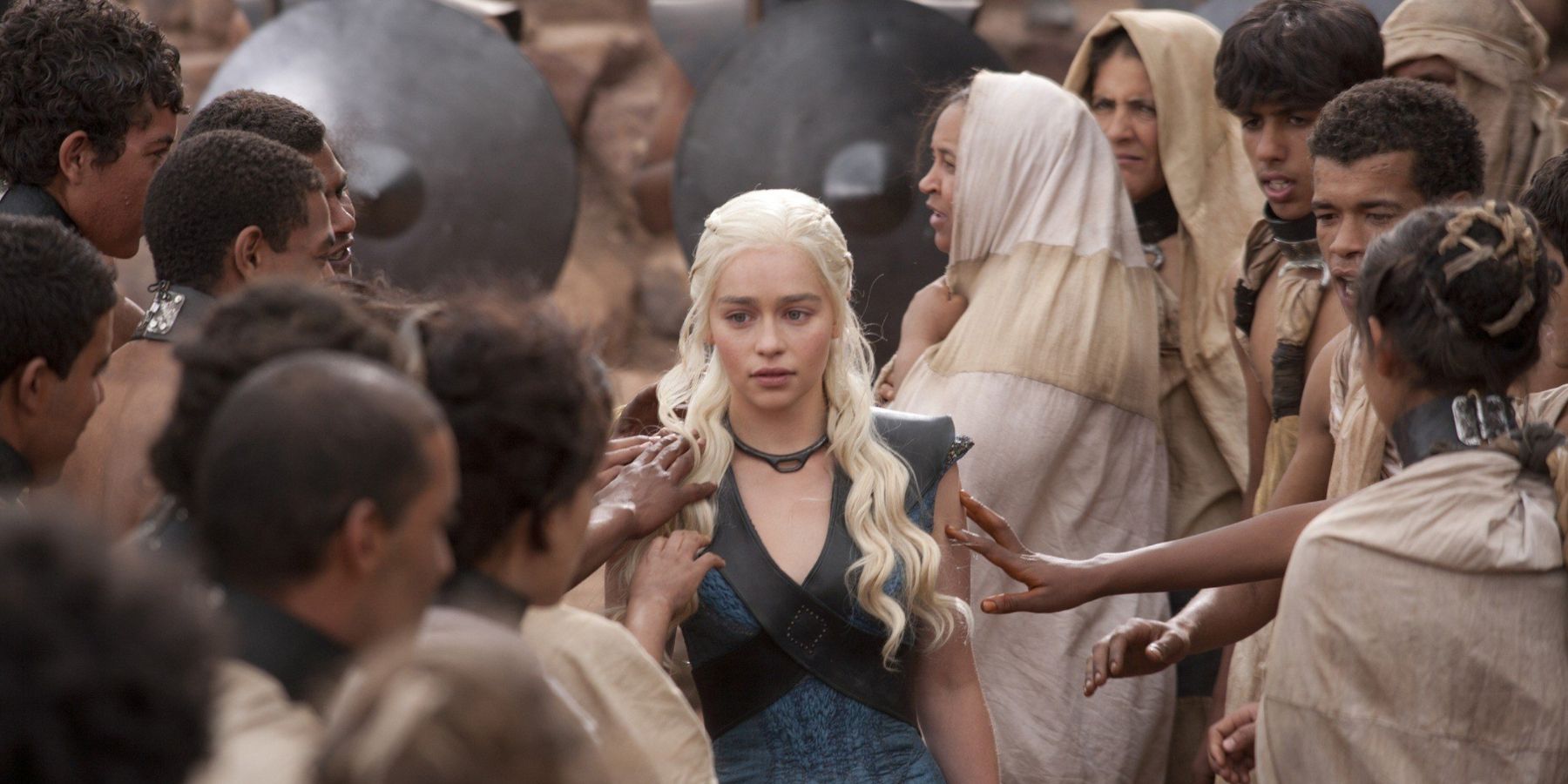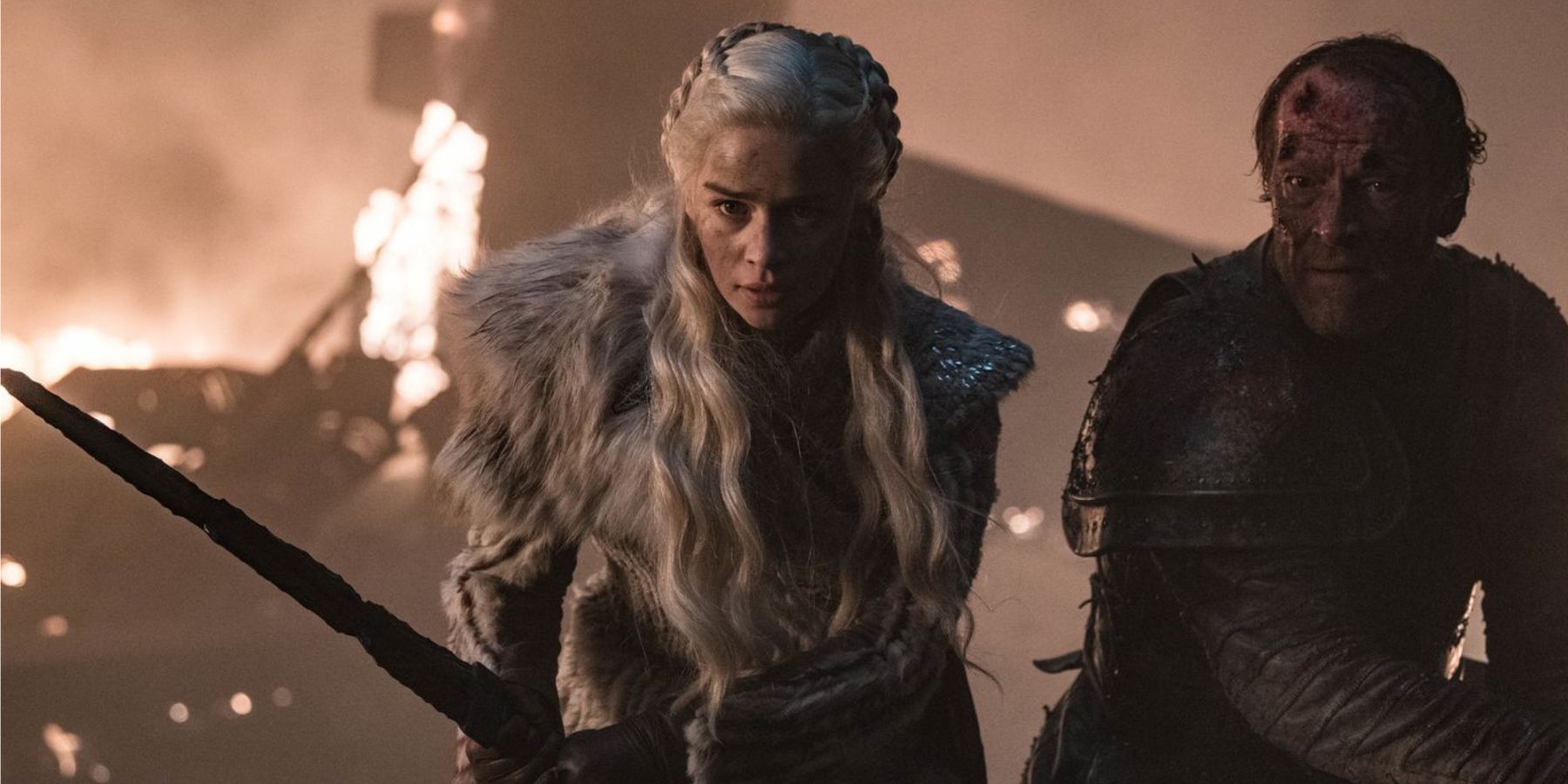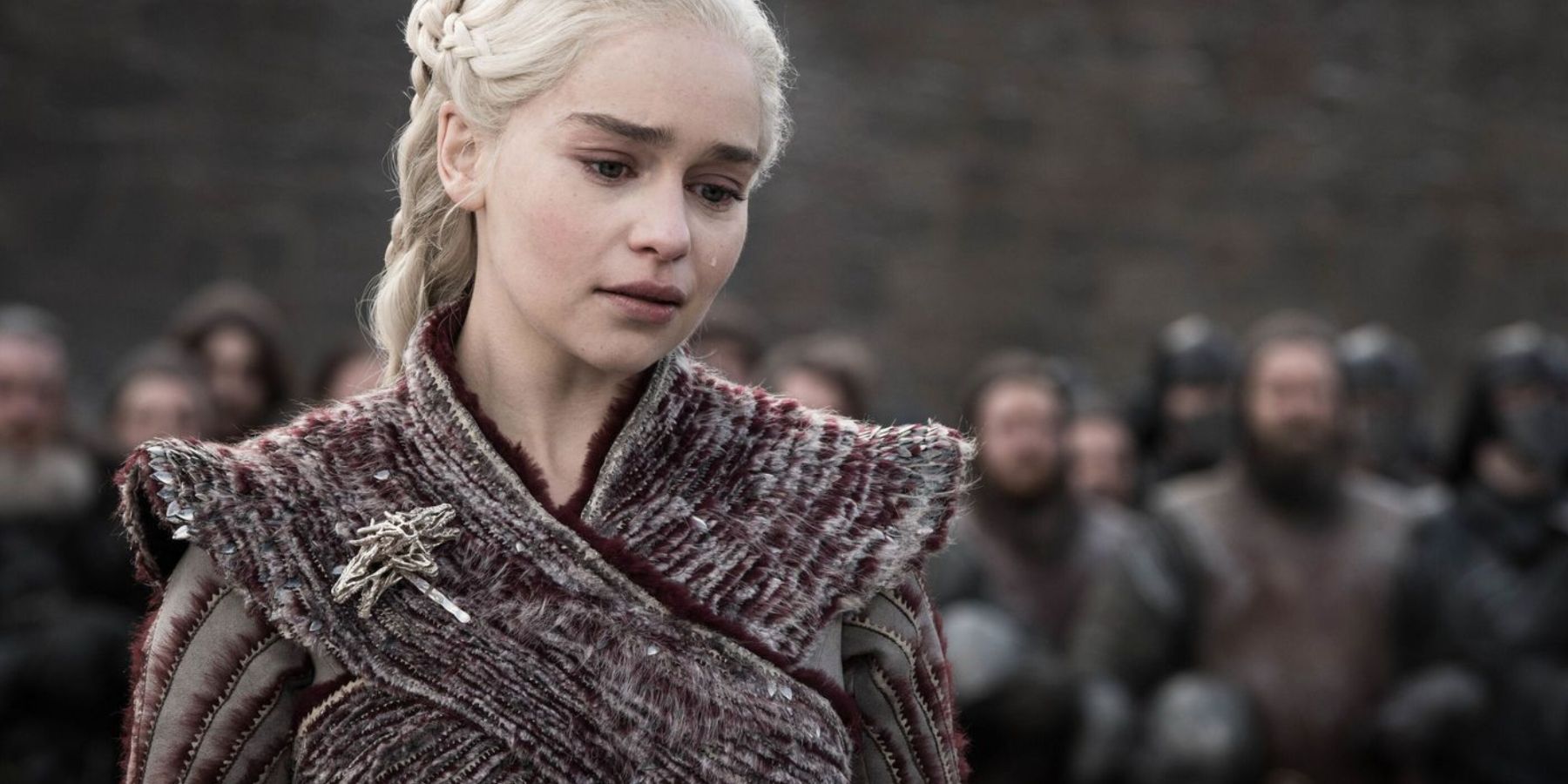
Emilia Clarke’s Daenerys Targaryen met an undeserved bad ending on Game of Thrones. Here’s why she should have been treated better.
Daenerys Targaryen spawned a larger-than-life arc that came to an end after Jon Snow plunged a dagger into her heart. Jon, who had repeatedly sworn allegiance to her in Game of Thrones’ divisive season 8, didn’t murder her to advance his own interests but did it as a last resort. Daenerys had worked her way up to the upper echelons of power, starting right after she was married off to the Dothraki warlord, Khal Drogo in Game of Thrones season 1, episode 1, “Winter Is Coming.” She embraced Dothraki traditions and earned the language from her handmaiden, Irri. Although the marriage was arranged by Illyrio Mopatis as a military alliance, Daenerys fulfilled her role as a Khaleesi out of reverence for the Khal and his Khalasar.
Daenerys proudly called herself “Khaleesi of the Dothraki,” forgave her brother, the Beggar King Viserys repeatedly for his abusive behavior, until one day she had enough and watched Drogo pout molten gold over his head. Because she had political acumen, she learned to command his Khalasar within no time. In Game of Thrones season 1, episode 3, “Lord Snow,” she ordered the horde to halt while traversing the Dothraki Sea after seeing a slave being abused. She was implicitly sympathetic when Jorah Mormont informed her how the Dothraki acquired slaves. For this countless other reasons, her descent into the Mad Queen who burned King’s Landing in Game of Thrones’ penultimate episode is without rhyme or reason.
Daenerys Is the Breaker Of Chains
Midway through Game of Thrones season 1, Daenerys ate a raw stallion heart in a Dothraki ritual officiated by the Dosh Khaleen priestess, proclaiming her unborn son would unite the world. “The Stallion who mounts the world,” declared the priestess, and the Dothraki rejoiced for the arrival of “Khal of Khals.” Daenerys found immense love and respect among the Dothraki, despite the fact that she was a complete outsider. Her leadership trait to fit in is observed every step of the way in her journey from Essos to Westeros. Khal Drogo’s plan to invade Westeros didn’t come to fruition, and he succumbed to an infected wound. The Lhazareen godswife, Mirri Maz Duur placed him in a catatonic state and killed Daenerys’ unborn son using blood magic.
Daenerys was left with Jorah Mormont, and a few Dothraki loyalists by her side. She took the three dragon eggs that she acquired as a wedding gift from the Illyrio and walked into the flames of Drogo’s funeral pyre. By dawn, she rose like phoenix from ashes with her dragon hatchlings. The pivotal moment in Game of Thrones season 1, episode 10, “Fire and Blood” marked the birth of the Mother of Dragons. Daenerys traversed vast lands from season 2 until she set sail for Westeros in Game of Thrones season 6, episode 10 “Winds of Winter.”
In the Sack of Astapor, Daenerys commanded her newly-acquired Unsullied soldiers to slay the masters and liberate the slaves. She gave the Unsullied a choice to serve her as free men or leave. Ser Jorah Mormont and Ser Barristan Selmy (who served in the Kingsguard of Aerys II Targaryen) were awed by Daenerys’ benevolence and fiery personality. The slave trader, Kraznys mo Nakloz’s translator, Missandei also chose to accompany her knowing that Daenerys was going to war. Missandei showed the Mother of Dragons unwavering loyalty not because of her last name but because she believed in her until her end. She was executed in Game of Thrones season 8, episode 4 “The Last of the Starks.”
Daenerys’ Selfless Acts
Daenerys didn’t need to free Yunkai, and Jorah was right, taking the Slaver City wouldn’t bring her any closer to Westeros. Nevertheless, she stood her ground saying, “We have two hundred thousand reasons to take the city,” a number proportionate to Yunkai’s slaves. She was given the moniker, “Mhysa,” meaning mother in the Old Ghiscari language after freeing Yunkai. She also gave the Unsullied the right to choose their names and discard derogatory slave names such as Vermin, Grey Worm, and so forth. She marched to Meereen in Game of Thrones season 4, episode 1 “Two Swords,” and freed what was the largest Slaver Cities of Slaver’s Bay.
Daenerys ruled Meereen as Queen and saw to it that she administered justice. She imprisoned her two full-grown dragons, Rhaegal and Viserion within the Great Pyramid of Meereen after Drogon burned a three-year-old girl. She did so not just to appease the people of Meereen but to keep her subjects out of harm’s way. She quelled the insurgency of the Sons of the Harpy and acted on her dream of breaking the wheel of oppression. With each season, Daenerys grew in stature and earned the faith of Westerosi allies, namely the Ironborn, the Dornishmen, and the Reachmen. She found devotion in Tywin Lannister’s hated son, Tyrion, whom she named Hand of the Queen. She also had the confidence of the cunning diplomat, Lord Varys. Her dragons meanwhile grew into full-sized, disciplined serpentine beats.
With a gigantic army at her back, the powerful Daenerys met the King in the North, Jon Snow in Dragonstone at the beginning of Game of Thrones season 7. Jon, traveled to Dragonstone because he needed to mine Dragonglass and turn it into weapons to be used against the White Walkers. She’d summoned him to bend the knee and join her in defeating her enemies in King’s Landing, but he declined, saying he wasn’t beholden to the vows some Stark ancestor made. Nevertheless, after defeating the combined Lannister-Tarly forces in the Goldroad ambush, and rescuing Jon and his ranging party beyond the Wall, she promised her full support to help in the Great War against the Night King and his army.
Daenerys’ Descent Into Madness
Daenerys’ conquest was sidetracked after meeting Jon. She declared a temporary truce with Cersei Lannister and traveled to the North to fight the Great War. She made the biggest contribution to the war, in that, she gave her armies, and her dragons to protect the North. Like a true ruler, she protected Winterfell, while the trueborn daughter of Ned Stark, Sansa hid in the crypts. Her dragons and armies proved pivotal in Game of Thrones season 8, episode 3 “The Long Night,” and yet she gained nothing in return. While Jon was being hailed by the Northerners, everyone conveniently forgot about her sacrifices.
Daenerys’ last engagement in the war for Westeros was the Battle of King’s Landing. She’d suffered massive losses before the battle, and on Tyrion’s insistence, given Cersei a chance to surrender. She lost her beloved handmaiden, Missandei, thanks to her Hand. Rhaegal, Viserion, and her most-trusted advisor, Ser Jorah were gone, and she’d executed the turncoat, Varys. That said, Daenerys was no stranger to no losses because she’d lived her life in exile, and experienced betrayals. She still had a powerful army at her back, a full-sized dragon, and the love of Grey Worm and her armies.
The writing failed to explain what snapped inside her and how she transformed into the Mad Queen who burned men, women, and children all the same. It’s unfair how Jon was able to walk up to an unguarded Queen of the Seven Kingdoms, murder her, and be sent to the Wall for regicide. If all of these developments were given adequate time, they’d still not be enough to justify Daenerys’ descent into madness. Hadn’t the Mad King earned his name, and weren’t Cersei and Joffrey cruel from the get-go? Truth is, Game of Thrones sacrificed Daenerys’ character for shock value, with the writing being nothing but counter-intuitive.


